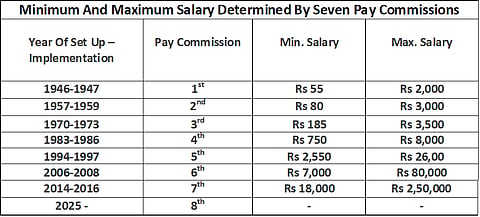The National Council-Joint Consultative Machinery (NC-JCM) asks for a fitment factor of no less than 2.57 in the recommendations of the 8th pay commission. NC-JCM is an official body that facilitates dialogue between the staff and the official side of the government, helping to resolve disputes between them. Notably, the 8th Pay Commission was approved by the government in January 2025 after a few months’ delay. Historically, it took at least a year for the Commission to provide its recommendation on revising pay scales and pensions.
However, recently, Shiv Gopal Mishra, Secretary, NC-JCM, said on a TV channel that NC-JCM has provided the Commission with the proposed terms of reference (ToR) from the staff side. He also demanded a meeting with the standing committee to discuss the proposal.
Also Read: ITR 2025: File Your Updated Returns for FY22, FY23 Before This Date
Fitment Factor And NC-JCM’s Expectations:
Among various demands mentioned in the ToR, such as including dearness allowance in the basic pay, revising the salary structure, reforming the Modified Assured Career Progression (MACP) scheme, revising family unit size, NC-JCM asked for making revisions keeping in mind the rising cost of living and the kind of expenses like internet expenses which are not included in the prevailing Aykroyd formula. The formula is named after Dr Wallace Aykroyd, a nutritionist, who devised it to calculate the minimum cost of living based on basic needs like food, clothing, and shelter for an average person.
At present, the salary structure follows this formula and the fitment factor. The fitment factor is a multiplication unit or a multiplier to calculate the new salary.
It is where NC-JCM expects it to be 2.86 and definitely not less than 2.57, recommended in 2015 and implemented in 2016 by the 7th pay commission. However, employee unions seek a higher fitment factor of 3.67.
How Fitment Factor Can Affect Salary Increase:
The revision in salary and pension will be based on the fitment factor. A higher fitment factor means a larger salary increase.
For example, if the fitment factor remains the same at 2.57, the current minimum salary of Rs 18,000 will become Rs 46,260 (Rs 18000 X 2.57). The pension will also change from the minimum Rs 9,000 to Rs 23,130 (Rs 9,000 X 2.57).
If the fitment factor is determined at 2.86, the salary will rise to Rs 51,480 (Rs 18,000 X 2.86) and the pension will increase to Rs 25,740 (Rs 9000 X 2.86).
However, if the Commission recommends a lower fitment factor, the salary, pension, and allowances will also increase less.
Also Read: Things You Must Do Before The FD Rate Falls!
Here are the historical minimum and maximum wages determined by seven pay commissions since the beginning.
